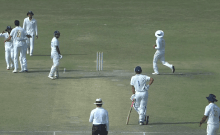
The Board of Control for Cricket in India (BCCI) has suspended all-rounder Yusuf Pathan for five months for anti-doping violation. However, the Baroda cricketer is still out of the trouble and could face a lengthy ban as per World Anti Doping Agency (WADA) Code.
Yesterday (January 9), BCCI had said, "Mr Yusuf Pathan has been suspended for a doping violation. Mr Pathan had inadvertently ingested a prohibited substance, which can be commonly found in cough syrups.
"Mr Pathan had provided a urine sample as part of the BCCI's anti-doping testing program during a domestic T-20 competition on 16th March 2017 in New Delhi. His sample was subsequently tested and found to contain Terbutaline. Terbutaline, a specified substance, is prohibited both In & Out of Competition in the WADA Prohibited List of Substances."
The 35-year-old's ban started on August 15 and will end on January 14. It is for a period of five months. However, as per WADA Anti-Doping Code, Yusuf's "not intentional" use attacts four-year suspension.
Tennis superstar Maria Sharapova had been banned for two years for "unintentional" use of a drug and later it was reduced to 15 months when she appealed in Court of Arbitration for Sport (CAS).
WADA has made it clear that Yusuf's is a "pending case" and won't comment. "As this is a pending case, we are not in a position to comment," informed Maggie Durand, WADA's Manager, Media Relations and Communications, told "PTI" via email.
Here is what WADA Anti-Doping Code 2015 says
2.2 Use or Attempted Use by an Athlete of a Prohibited Substance or a Prohibited Method
2.2.1 It is each Athlete's personal duty to ensure that no Prohibited Substance enters his or her body and that no Prohibited Method is Used. Accordingly, it is not necessary that intent, Fault, negligence or knowing Use on the Athlete's part be demonstrated in order to establish an anti-doping rule violation for Use of a Prohibited Substance or a Prohibited Method. 2.2.2 The success or failure of the Use or Attempted Use of a Prohibited Substance or Prohibited Method is not material. It is sufficient that the Prohibited Substance or Prohibited Method was Used or Attempted to be Used for an anti-doping rule violation to be committed.
10.2.1 The period of Ineligibility shall be four years where:
10.2.1.1 The anti-doping rule violation does not involve a Specified Substance, unless the Athlete or other Person can establish that the anti-doping rule violation was not intentional.
10.2.1.2 The anti-doping rule violation involves a Specified Substance and the Anti-Doping Organization can establish that the antidoping rule violation was intentional. 10.2.2 If Article 10.2.1 does not apply, the period of Ineligibility shall be two years.













